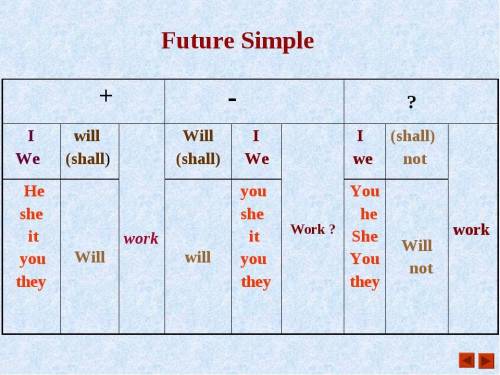I Choose the right variant.
Mary c) will watch TV tomorrow.
Friends a)are jumping at the stadium now.
Ben often a)drinks juice.
Lucy b) cleaned her teeth yesterday.
We b) are listening to music now.
They c) will buy a flat next year.
Mary a)sings every day .
My mother b) cooked soup yesterday.
II Ask a special question.
Sam is playing the piano now. (What?)
What is Sam playing now? или What is Sam doing now?
Boys locked the door yesterday. (When?)
When did boys lock the door?
We will swim in the sea next summer. (Where?)
Where will we swim next summer?
Kitty often reads books. (Who?)
Who often reads books?
Время Future Simple ссылается на действие, которое совершится в неопределенном или отдаленном будущем.
д ля того, чтобы поставить глагол во временную форму Future Simple, нужно использовать его начальную форму и вс глагол will. В устной речи will чаще всего сокращается до формы ‘ll, которая может использоваться во всех лицах. Однако, в современном английском, особенно в устной речи, will стал использоваться для всех лиц:
Примечание:
Ранее при употреблении будущего времени для первого лица (I, we) было принято использовать вс глагол shall:
Объяснение:

0. we learn a lot of new words. - we used a lot of new words.
1) we walk in the park every day. 2) he is a good student. 3) he drinks coffee with all the food. 4) they come to school by bus. 5) he needs a new a suit. 6) he speaks to us in english. 7) we are good friends. 8) he has many friends here. 9) they have a new car. 10) she and i are students in the same class.
exercise 3. change the sentences in the question form:
0. they lived next to us. - they lived next to us?
1) he told me about it yesterday. 2) she was waiting for us on the corner. 3) they wrote him several letters. 4) the bus stopped at this corner. 5) they had dinner with us last night. 6) she wanted to come with us. 7) he preferred to stay at home. 8) monica knew his very well. 9) you got up very early this morning. 10) they came to school by bus.
exercise 1. change the sentences to negative form:
0. the bus stopped at this corner. - the bus didn't stop at this corner.
1) he often came to us. 2) they had a lot of friends in our class. 3) i bought all my books at the school bookstore. 4) they usually spoke to us in english. 5) we always dined in the cafeteria. 6) they were good students. 7) she was my teacher. 8) i waited on the corner to them. 9) he asked us about directions. 10) i got up very early.